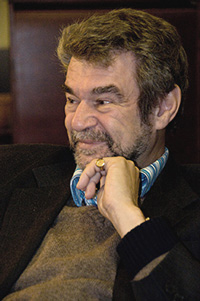Forty Years in Perspective – The BIS Label’s Pianists
It is always a pleasure to congratulate a person who spent forty years in business, regardless of their trade. Therefor it was a very special moment for Piano Street when we got the chance to talk to Robert von Bahr, Founder of BIS Records, about the past, present and the future.
We highly appreciate BIS’ and eClassical’s free bonus track and special product prices to all Piano Street’s readers worldwide:
Six BIS Pianists – Introductions and Selected Recordings
 Scriabin: Sonata no. 9 “Black Mass”
Scriabin: Sonata no. 9 “Black Mass”
Yevgeny Sudbin – introduced by BIS A&R Director Robert Suff
| Read more
 Beethoven: Sonata Opus 57 “Appassionata”, 1st mvt.
Beethoven: Sonata Opus 57 “Appassionata”, 1st mvt.
Ronald Brautigam – introduced by BIS Founder Robert von Bahr
| Read more
 Gershwin: Piano Concerto in F
Gershwin: Piano Concerto in F
Freddy Kempf – introduced by BIS A&R Director Robert Suff
| Read more
 Ligeti: Musica Ricercata No. 7, Cantabile, molto legato
Ligeti: Musica Ricercata No. 7, Cantabile, molto legato
Fredrik Ullén – introduced by BIS Founder Robert von Bahr
| Read more
 Debussy: Prelude No. 10 (La cathédrale engloutie)
Debussy: Prelude No. 10 (La cathédrale engloutie)
Noriko Ogawa – introduced by BIS A&R Director Robert Suff
| Read more
 Schnittke: Sonata for cello & piano No. 1, 2nd mvt: Presto
Schnittke: Sonata for cello & piano No. 1, 2nd mvt: Presto
Roland Pöntinen – introduced by BIS Founder Robert von Bahr
| Read more
Interview with BIS Founder Robert von Bahr
Patrick Jovell: BIS is known as a recording company renowned for its impeccably high standards of quality, aknowledged internationally with numerous awards for its achievements. And next year, 2013, marks the 40th year for you in the record industry.
Could you summarize the developments within your business during this period of time, not only concerning the advancements from vinyl-LPs to CD-discs and further to the increasing concentration on digitalized production, but also how the prerequisites or conditions for continued endeavors have changed?

BIS Founder Robert von Bahr
PJ: How does establishing oneself in the market today compare with how it was when you started?
RvB: Actually, I don’t see a difference at all. In classical music, it is the quality that counts, not any gimmickery. Probably we should be more updated on social media than we are, and possibly in modern times the level of the concentration span has decreased in the times of the increasing “spotifying” of everything to 20-second snippets.
PJ: In this article we meet some of the BIS-pianists, and particularize the interplay between the artist´s unique attributes, repertoire, career and future projects leading to an exciting and creative recording process. This constitutes the firm´s ”piano-profile”. Tell us how your relationships with pianists unfold and develop, seen from the perspective of a business concern.
RvB: Also here we don’t maintain that we’re sitting on all the answers to Universe’s big secrets. We can, given our experience, which is uniquely long (with its 40 years BIS is the oldest classical label in the world, led by its Founder), quite quickly identify different artists and their strengths and decide, if and where their talent could be mutually profitable, both artistically and, not to put too fine a point at it, monetarily. We are loathe to employ artists for a one-off production, which inevitably increases the height of the threshold that they have to pass in order to become a BIS Artist, but, having managed that first hurdle, the ambition is to create a fruitful and durable relation – a symbiosis that allows the artist to develop hand in hand with an extention and broadening of BIS’s repertoire. All the pianists presented here belong to the core BIS artists and have recorded for us during long periods of time (between 8 and
29 years). These artists complement each other – indeed that was a prerequisite to work with them at all – but, inevitably, there are duplications of standard repertoire, albeit done rather differently. The operational word is, though, a common artistic development in symbiosis, for the mutual good of everyone concerned, and foremost the happy listener.
PJ: We will soon be able to read here on Piano Street an article about the non-compressed audio format FLAC and about your involvement in the digital distribution service which is offered by eClassical.com. How do you feel about the consensus concerning sound in mainstream production where compression is if anything more of a rule than an exception? How does audio compression affect our listening?
RvB: When it comes to sound quality and dynamics, we at BIS have but one answer: whatever the composers demanded and the artists performed. We simply don’t tamper with whatever the artists are doing. That’s the only way I know how to be honest, both to the artists and to the listener. Why should the listener be presented anything that has gone through the “filter” of a recording engineer, with or without talent, when it comes to the dynamics? And, having arrived at the conclusion that this simply is not on, we can extend this to the other part of sound quality as well, like bit-rate. Previously there were technical limitations that one simply had to accept, but, with the ever-increasing speed of Internet, this no longer is so. Therefore, after looking at what the “normal” sites are offering people in the form of down-loading, especially with the sharply constricted dynamics and the tampering through compression, I decided that this is not for us, at least not without giving the public-at-large an alternative to choose from. Therefore BIS bought eClassical.com and completely rethought the principles, after which a downloading site should be run – for classical music, nota bene – and implemented the changes, all of which are devised for two purposes:
– to present the music completely unadulteredly and
– in a way that makes sense for the customer from the points of view of expeditiousness, quality, guarantee and price.
PJ: We who listen to productions from BIS other than piano are fascinated by the exciting artistic collaborations which take place. We have been able to hear, for example, symphony orchestras from Sao Paolo or Malaysia, opera voices from Cape Town or Beethoven´s symphonies with the Minnesota Symphony Orchestra, or Mahler´s Das Lied von der Erde sung in Chinese and with the Singapore Symphony Orchestra. Tell us about your thoughts and considerations behind these unique international and cultural synergistic results.
RvB: I simply believe that music is one of the very few cross-cultural languages – art and architecture being other examples – around. I also – and vehemently at that – do NOT subscribe to the notion that one has to be Norwegian to play Grieg or Finnish to play Sibelius (if that were the case, where should one have been born to do justice to Stravinsky? Russia, France, Switzerland, America?). On the contrary, I believe that the cultural baggage that every musician has somewhere, can cross-fertilize with the ones that the composers had and lead to something new and perhaps more interesting than if the music is performed “like it always was”. Therefore I consciously make odd couplings, like the ones enumerated above, or “worse” (like a Japanese pianist playing Russian repertoire with a Singaporean orchestra and a Chinese conductor, recorded by German producers for a Swedish label). Sometimes this really turns out well, like with the leading Bach Cantata cycle in the world, performed almost exclusively by Japanese (sic!), and very rarely not (but what evolution is there, if one doesn’t risk anything??). I also believe strongly in international understanding through performing together – if someone had put Hitler, Roosevelt, Stalin and Churchill in a room and told them that they couldn’t exit it until they had learned how to play a string quartet movement, there would have been no WWII, of that I am sure. How the Nobel Prize Committee in Norway could give the Peace Prize to EU rather than to Barenboim will go down as one of the big mysteries of all time.


Comments
Superb interview! Robert von Bahr´s commentary is succinctly explicative and elucidating! Thanks for making it available to the music world-audience!
Congratulations to Management and Staff of BIS! Thanks for your wonderful work over the past 40 years, and long may you continue. Long live BIS!!! I enjoyed reading the information contained in the interview, and it has rekindled a spark within me to continue learning more about music. Thanks, again.